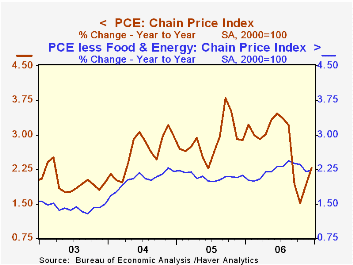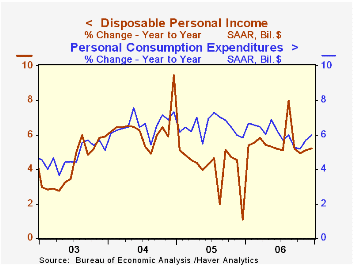 Global| Feb 01 2007
Global| Feb 01 2007U.S. Personal Income Firm, Core Prices Tame
by:Tom Moeller
|in:Economy in Brief
Summary
Personal income increased 0.5% after two months of 0.3% rise and matched Consensus expectations. For the year, income rose 6.4%, faster than the 5.2% gain during 2005. Wages & salaries jumped 0.6% (6.4% y/y) and for the whole year [...]

Personal income increased 0.5% after two months of 0.3% rise and matched Consensus expectations. For the year, income rose 6.4%, faster than the 5.2% gain during 2005.
Wages & salaries jumped 0.6% (6.4% y/y) and for the whole year rose 6.6% after the 5.1% increase during 2005. Last year's gain was the strongest since 2000. Factory sector wages made up for the prior month's slip with a 0.2% (3.8% y/y) increase. The full year gain of 4.7% also was the strongest since 2000. Wages in the private service-producing industries rose a strong 0.8% (7.0% y/y) and for the year rose 7.2%.
Interest income declined 0.4% (+3.0% y/y) for the third consecutive month and earlier months' gains were revised away. Dividend income surged 1.1% (11.7% y/y) for the fourth month and for the year rose 11.3%.
Disposable personal income advanced 0.5% (5.2% y/y), better than the 0.3% increase during November and for the year rose 5.5%. Personal taxes increased 0.7% (10.9% y/y) and for the year rose 13.3%. Real disposable personal income rose 0.2% (2.9% y/y) last month and for the year rose 2.7%. Real disposable income per capita rose 1.8% last year, up from the 0.2% gain during 2005.
Personal consumption surged 0.7% last month after an unrevised 0.5% gain during November and matched expectations. Last month's gain was helped by a 4.4% (-2.1% y/y) increase in unit auto sales. That lowered the year's gain in spending to 6.0% from 6.5% during 2005. Spending on nondurables grew 1.6% last month and 7.0% for the year but adjusted for higher prices nondurables spending grew just 0.6% in December and 3.8% last year. Real consumer spending rose 0.3% after a 0.5% November gain and grew 3.2% for the year, down from 3.5% during 2005.
The personal savings rate was a more negative -1.2% during December and in 2006 averaged -1.0%. Should the Decline in the Personal Saving Rate Be a Cause for Concern? from the Federal Reserve Bank of Kansas City is available here.
The PCE chain price index rose a firm 0.4% due to a 3.7% gain in gasoline prices which has since more than reversed. Prices less food & energy ticked up 0.1% after no change in November. The three month change in core prices fell to 1.7% (AR), the lowest since February.
| Disposition of Personal Income | December | November | Y/Y | 2006 | 2005 | 2004 |
|---|---|---|---|---|---|---|
| Personal Income | 0.5% | 0.3% | 5.9% | 6.4% | 5.2% | 6.2% |
| Personal Consumption | 0.7% | 0.5% | 6.0% | 6.0% | 6.5% | 6.6% |
| Savings Rate | -1.2% | -1.0% | -0.3% (Dec. '05) | -1.0% | -0.4% | 2.0% |
| PCE Chain Price Index | 0.4% | 0.0% | 2.3% | 2.8% | 2.9% | 2.6% |
| Less food & energy | 0.1% | 0.0% | 2.2% | 2.2% | 2.1% | 2.0% |
Tom Moeller
AuthorMore in Author Profile »Prior to joining Haver Analytics in 2000, Mr. Moeller worked as the Economist at Chancellor Capital Management from 1985 to 1999. There, he developed comprehensive economic forecasts and interpreted economic data for equity and fixed income portfolio managers. Also at Chancellor, Mr. Moeller worked as an equity analyst and was responsible for researching and rating companies in the economically sensitive automobile and housing industries for investment in Chancellor’s equity portfolio. Prior to joining Chancellor, Mr. Moeller was an Economist at Citibank from 1979 to 1984. He also analyzed pricing behavior in the metals industry for the Council on Wage and Price Stability in Washington, D.C. In 1999, Mr. Moeller received the award for most accurate forecast from the Forecasters' Club of New York. From 1990 to 1992 he was President of the New York Association for Business Economists. Mr. Moeller earned an M.B.A. in Finance from Fordham University, where he graduated in 1987. He holds a Bachelor of Arts in Economics from George Washington University.






